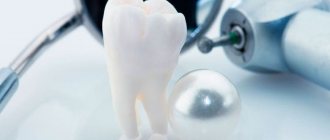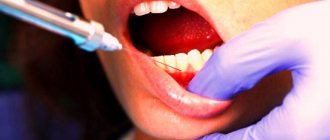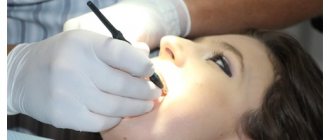27.04.2020
Pregnancy is a time when a woman needs to improve her health and monitor her well-being. From the antenatal clinic, expectant mothers are referred for a mandatory medical examination to doctors, including a dentist. The condition of your teeth should be checked before pregnancy. If this was not possible, then it is possible to correct it during the period of bearing the baby.
Thanks to the development of dentistry for pregnant women, all procedures are performed almost painlessly, with minimal risk to the health of the mother and child. The doctor will identify existing problems and tell you the intricacies of caring for the oral cavity in this condition. Procedures when expecting a baby are performed with relatively harmless drugs, and instead of an x-ray, a dental visiograph is taken.
Why you should postpone implantation during pregnancy
Most experts rightly believe that during pregnancy, dental implantation should be delayed. Especially if there are no urgent medical indications for this. Here are several arguments in favor of this decision:
- Implantation is stressful
. This is a surgical procedure that requires pain relief (anesthesia). At first glance, this may seem like a minor intervention, but it is not, especially for a pregnant woman. It is worth considering postoperative complications (for example, swelling) and limitations. Among the latter are some dietary restrictions, which are undesirable for pregnant women. - The effect of x-rays
. Before implantation, radiographic examinations (for example, panoramic X-ray) must be performed. These are additional doses of radiation that are undesirable during pregnancy. - Medications
. Dental implantation during pregnancy also means an additional drug load on the body. In particular, this is the administration of anesthetics, and after surgery - the use of antibiotics and painkillers. During pregnancy, such medications are prescribed only in extreme cases. - Calcium and other elements
. A pregnant woman spends significant resources of her body on the development of the fetus. In this sense, dental implantation in such a situation may turn out to be of poor quality, because calcium and other microelements are also necessary for successful implantation.
Considering the difficulties that sometimes arise, most doctors are inclined to believe that implantation and pregnancy are incompatible. Therefore, if you are in the process of installing dental implants (and this takes up to 6 months), then it is better to hold off on plans to conceive a child.
Implantation in women
Male and female bodies are structured differently, so it is important to consider certain factors before undergoing surgery. Many life stages for girls are associated with serious changes in their body. These are not only hormonal imbalances, but also the psychological state, as well as the ability of the immune system to resist negative external factors.
A woman is considered the most vulnerable during menopause, during her menstrual periods, as well as when planning a pregnancy, during pregnancy and breastfeeding. Any of these conditions requires maximum professionalism and care from the doctor; in some cases, it is best to refuse all surgical interventions.
The question is not so much the ability of an organism weakened during pregnancy to undergo surgery, but rather the ability to achieve the expected result without complications. The period when the hormonal background is being rearranged is not entirely favorable for the introduction of foreign objects into the tissues of the oral cavity; the risk of rejection will be high. In addition, it is recommended to think about the well-being of the baby, because a variety of medications are used during treatment.
How long can it be safe to place an implant?
If you have already decided to install implants, then you need to understand that dental implantation during pregnancy is optimal at 12-29 weeks of gestation. During this period, all organs and systems of the fetus are already formed, so the likelihood of complications is minimized.
Important!
It is strictly forbidden to place an implant in the early stages of pregnancy. During this period, all the tissues and organs of the baby are formed. It is important that this process proceeds correctly, without unnecessary stress on the mother’s body.
It should be taken into account that dental implantation for pregnant women is not carried out in all cases. In this situation, a woman must visit the dentist. The decision about implantation is made by doctors based on the current state of health. In most cases, they prefer to postpone implantation or replace it with other types of tooth restoration.
General overview of the operation
To understand whether dental implantation poses a danger to the mother and unborn child, you need to at least have a general idea of what dental implantation is.
An artificial tooth is a composite element consisting of 3 parts:
- The implant itself, similar in appearance to a regular threaded bolt. Implants are made from bioinert titanium alloys.
- An abutment is an intermediate part of an artificial tooth that is attached to the implant and serves as the basis for attaching the crown part.
- Crown of the tooth.
There are several technologies for installing implants. One of them looks like this:
- Examination of the oral cavity and preparation for the installation of an artificial tooth.
An X-ray of the jaw, sanitation of the jaw, selection of the type of implant, and hygienic measures are carried out. At the preparatory stage, it may become clear that the jaw bone is too narrow and needs to be augmented (bone grafting). - Implant installation . It is performed under local anesthesia. It consists of a number of separate operations - creating access to the installation site (removing the periosteum), drilling a hole for an artificial root, screwing in an implant, installing a gum former.
- Prosthetics . The former is removed, a transfer is fixed in its place, an impression is taken, an abutment is selected, the crown is fixed and adjusted.
- The abutment is attached to the implant after the last element has taken root in the bone tissue. This takes several months (3-4 for the lower jaw and 5-8 for the upper).
It is important to understand that installation of an implant - its healing (osseointegration), installation of an abutment and crown - is a long process, it can take about a year.
What functions does the temporary abutment perform and types of elements.
Come here if you are interested in what vertical alveolar ridge augmentation is.
At this address https://www.vash-dentist.ru/implantatsiya/metodiki/sozdaetsya-iskusstvennaya-desna.html we will find out who is recommended for installation of a prosthesis with an artificial gum.
What should pregnant women do if a tooth is missing?
If during pregnancy a problem arose in the dentition (or you did not have time to solve it after becoming pregnant), then the algorithm of actions is as follows:
- Do not panic.
Remember that dental problems are temporary. After pregnancy, you will be able to eliminate all defects. And unnecessary worries in such a situation are completely undesirable. In addition, dentists can offer you dental prosthetics during pregnancy and a number of other alternative methods that have no absolute or temporary contraindications. - Get tested
. After conceiving a child, your obstetrician-gynecologist is responsible for your health. It is this doctor who decides on the advisability of certain medical interventions during pregnancy. Therefore, after visiting the dentist, you should consult your gynecologist, who will give his opinion regarding dental implantation. - Choose a competent dentist
. At the Center of Israeli Dentistry, doctors have extensive experience working with pregnant women. It is important to contact a specialist who understands all the nuances of women’s health in this situation.
Alternative to implantation during pregnancy
If the issue of restoring a lost tooth (or teeth) is urgent, then dentists can offer pregnant women a number of alternatives. In particular, these are:
- removable dentures;
- fixed dentures.
This can be either a temporary or permanent solution to an existing problem. In this case, everything depends on the defect itself, medical indications and patient preferences. It is noteworthy that if the tooth root is preserved, then crowns can be placed on special (stump) inlays.
Anesthesia and pregnancy
The main problem in performing bone grafting during pregnancy is the need for pain relief. This surgical intervention requires local, and in some cases even general anesthesia, which poses a serious danger to expectant mothers.
Local anesthesia is carried out with novocaine drugs, which, first of all, are strong allergens. The occurrence of anaphylactic shock is a dangerous complication for any patient, but a pregnant woman risks not only her life, but also her fetus. In addition, possible complications from local anesthetics may include the following:
- Teratogenic effect on the fetus (especially if anesthesia is used in the first trimester);
- Acute fetal hypoxia or manifestation of chronic lack of oxygen, if the woman has a predisposition;
- Increased tone of the uterus (a dangerous problem that leads to spontaneous abortions and premature birth, especially in those who have already been diagnosed with excessive tone of the muscle fibers of the organ).
In modern medicine, they try to use products that have minimal impact on pregnant women, but 100% safety cannot be guaranteed until now.
General anesthesia is used for expectant mothers only for health reasons. Since anesthesia involves putting a person into deep sleep with a slowdown of some functions, in particular breathing, its use during pregnancy is inappropriate.
Dental implantation during breastfeeding
The issue of dental implantation during breastfeeding is more complex and complex. The fact is that if a woman has lost a tooth during pregnancy, then postponing implantation for several months is not a problem. But if you delay this issue (for a year or more), then the risk of atrophic changes in the jaw bone increases. This is due to the lack of proper load on the area where the tooth previously was.
In this regard, the decision about implantation during breastfeeding is decided together with doctors. If anesthesia drugs are eliminated from the body quickly (which will not have a significant impact on the quality of feeding), then with antibiotics things are more complicated.
In most cases, as in the situation with pregnancy, during breastfeeding doctors also prefer alternative options - crowns, bridges, etc.
Is it possible to install an implant during lactation?
According to experts, the period of breastfeeding a baby is accompanied by the same contraindications as the period of pregnancy. Milk contains elements of various medications that enter the female body. Artificial feeding provides the opportunity to take antibiotics, but there are other contraindications:
- Surgical intervention during implantation is a huge stress for a weakened female body, so it is recommended to postpone the procedure for at least a year.
- During the first months of life, a newborn needs constant attention, so the mother simply will not be able to devote enough time to visits to a specialist.
What to do if pregnancy becomes known during the implantation process?
It also happens that pregnancy occurs during the implantation procedure (which often takes several months). Let us immediately note that there is nothing catastrophic in this. In this case, it is important to adhere to the following recommendations:
- Keep calm.
There is absolutely no need for unnecessary worries. If conception occurred after the installation of implants, then this indicates that the processes of osseointegration (engraftment of the implant into bone tissue) are already in full swing. - Notify doctors.
Tell your dentist about your pregnancy, and tell your gynecologist about implants. Doctors will take current circumstances into account. - Take vitamins and minerals
. Most likely, the doctor will prescribe vitamin and mineral complexes. In particular, these are preparations with calcium, fluorine, phosphorus and other elements. This is necessary for the harmonious development of the fetus during implantation. - Practice good oral hygiene
. Maintain good oral hygiene. During this period, infectious and inflammatory diseases (for example, gingivitis, periodontitis and others) are especially dangerous, because they will require taking antibiotics and other drugs that are undesirable during pregnancy.
FAQ
How long after giving birth can an implant be placed?
It is important to take into account several factors here: normalization of hormonal levels, normalization of the cycle, as well as breastfeeding. In most cases, implantation is carried out 1.5-2 years after birth.
Is it possible to get crowns while breastfeeding?
It is possible, but only after consultation with doctors. In this case, the effect of drugs (in particular, antibiotics) that can be used in dental practice is taken into account.
How does pregnancy affect installed implants?
Just as implantation negatively affects pregnancy, and vice versa. During gestation, the main part of nutrients and minerals goes to maintaining the woman’s vital organs and systems, as well as the formation of the fetus. In this case, osseointegration of the artificial root (implant) is considered by the body as a secondary phenomenon. Therefore, the quality of implantation may be low.
Is it possible to get pregnant after dental implantation?
Yes. In most cases, women of childbearing age who are planning a child are advised by doctors to postpone conception after having implants installed. You can plan for a child 4-6 months after implantation.
ATTENTION!
This material is not a substitute for medical advice and should not be used for diagnosis or treatment.
Sources:
- Vt H, TM, TS, Nisha VA, A A. Dental considerations in pregnancy—a critical review on the oral care. J Clin Diagn Res
. 2013;7(5):948-953. doi:10.7860/JCDR/2013/5405.2986 - Favero V, Bacci C, Volpato A, Bandiera M, Favero L, Zanette G. Pregnancy and Dentistry: A Literature Review on Risk Management during Dental Surgical Procedures. Dent J (Basel). 2022 Apr 19;9(4):46. doi: 10.3390/dj9040046. PMID: 33921608; PMCID: PMC8072957.
- Bajkin BV, Wahl MJ, Miller CS. Dental implant surgery and risk of bleeding in patients on antithrombotic medications: A review of the literature. Oral Surg Oral Med Oral Pathol Oral Radiol. 2020 Nov;130(5):522-532. doi: 10.1016/j.oooo.2020.07.012. Epub 2022 Jul 25. PMID: 32811791.
Postpartum period and implantation
During the postpartum period, dental implantation cannot be performed if the woman is breastfeeding. Anti-inflammatory treatment is also unacceptable, since most medications have a detrimental effect on the quality of milk and the health of the child in general.
Dental implantation surgery can be done only 3 months after the baby stops breastfeeding. During this time, the woman’s body will be able to recover.
If the child is bottle-fed, then these prohibitions are irrelevant. But even in such a situation there are some nuances. It is prohibited to begin prosthetics immediately after childbirth, since the young mother’s body is too weakened to withstand the operation. Even a small cut can lead to serious consequences. Tests show this.
It is advisable to perform the operation a year after birth. During this period, the body will recover after a long period of bearing a child. It is better to place implants in the absence of contraindications and pregnancy.
We can conclude that it is not worth doing such operations during pregnancy, breastfeeding and during the first year after childbirth, as this will have a bad effect on the health of the child and mother. As for pregnancy after dental implantation, there are no special restrictions.










